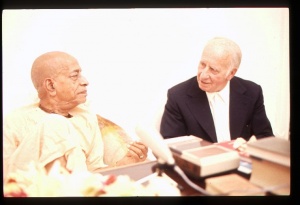CC Madhya 6.190 (1975)

A.C. Bhaktivedanta Swami Prabhupada
Below is the 1996 edition text, ready to be substituted with the 1975 one using the compile form.
TEXT 190
- nava-vidha artha kaila śāstra-mata lañā
- śuni’ prabhu kahe kichu īṣat hāsiyā
SYNONYMS
nava-vidha—nine kinds; artha—meanings; kaila—did; śāstra-mata—the principles of authorized scriptures; lañā—taking; śuni’—after hearing that; prabhu—Lord Caitanya; kahe—began to speak; kichu—something; īṣat—slightly; hāsiyā—smiling.
TRANSLATION
The Bhaṭṭācārya explained the ātmārāma verse in nine different ways on the basis of scripture. After hearing his explanation, Śrī Caitanya Mahāprabhu, smiling a little, began to speak.
PURPORT
The ātmārāma verse was discussed at Naimiṣāraṇya at a meeting of many great sages, headed by Śaunaka Ṛṣi. They questioned Śrīla Sūta Gosvāmī, who presided at the meeting, about why Śrīla Śukadeva Gosvāmī, a paramahaṁsa already in the transcendental position, was attracted to a discussion of the qualities of Kṛṣṇa. In other words, they wanted to know why Śrī Śukadeva Gosvāmī engaged in the study of Śrīmad-Bhāgavatam.